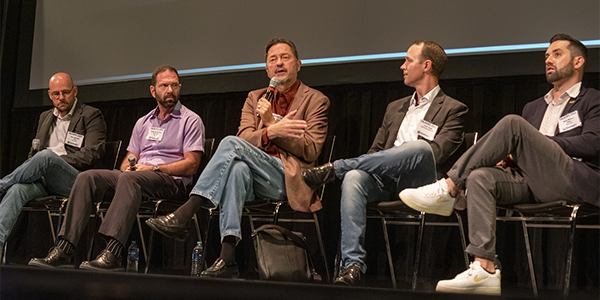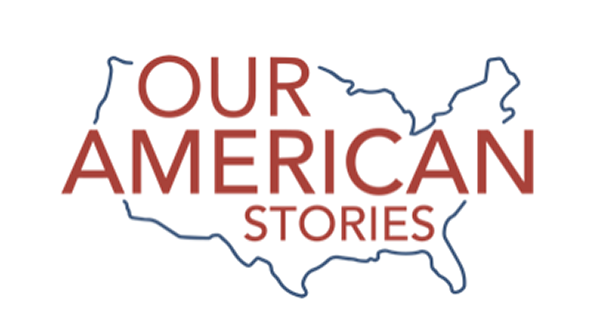SABO SEZ: Here are Five Original Ideas Worth Stealing
By Walter Sabo
Consultant, Sabo Media Implementers
A.K.A. Walter Sterling
Radio Host, “Sterling On Sunday”
Talk Media Network
 Original ideas are golden and rare. Here are five ideas worth stealing because of their novelty, success and oh-wow factor!
Original ideas are golden and rare. Here are five ideas worth stealing because of their novelty, success and oh-wow factor!
THE SECRET OF A GREAT TALK STATION – Tom Bigby founding program director of WIP Philadelphia. Tom turned up a large black knob to his left and it fed the phone screeners doing their work. He could monitor all calls coming in and how they were screened. He recorded all screener conversations and “I do air check sessions with the screeners.” declared Mr. Bigby.
ENTER AND YOU COULD WIN ALL THE CLOTHES – FOX FM Melbourne Australia. Every year FOX FM hosted the FOX FASHION SHOW at a mall. The event drove entries for a contest that awarded tickets to the show. Ok, normal.
Surprise: “And one listener will win all the clothes.” At the time, 2002, Brad March was the head of programming for owner, Austerio.
WE’LL BOOST SECURITY. When New Jersey 101.5 started, John and Ken hosted PM Drive – yes that John and Ken of KFI deserved fame. The hot topic was the station’s fantasy to eliminate tolls on the Jersey Turnpike. No one considered that eliminating tolls would mean firing unionized toll takers… in New Jersey.Somebody thought that was a bad idea and slashed the tires in the station’s parking lot. Lame owners would have shut down the topic. Bob McAllan, CEO of Press Broadcasting had no problems with the topic. His response: Heavy investing in hurricane fencing and super-bright lights for the building’s exterior. Bob kept the staff fearless and that is why the station is a success to this minute.
SOMEBODY’S GOT TO BE IN THE BUILDING ALL NIGHT. Thanks to the kindness of strangers, Sterling On Sunday and my guest host appearances for Westwood One have originated from great radio facilities throughout the northeast. Great empty facilities. After 10:00 pm clusters of stations housed in state of the art installations operate without one human body in the building. Not one, not a board op, or night editor, or anybody. It’s spooky and irresponsible. What if?? Dave LaBrozzi, Program Director of KDKA engaged a group of eager interns to work in the beautiful KDKA newsroom all night. Great training for the students and smart service to Pittsburgh.
WEBSITES ARE DIFFERENT. Radio 538 is the hot top 40 in the Netherlands. Dan Mason and I consulted them and learned that they recognized that a website is not a radio station. They built web content that had nothing to do with the radio station, except in spirit, but was very appealing to online consumers. Note that all of the stars on online video are native to the medium. Hollywood stars who tried to cross to digital, failed. Different medium. Build web-only content for traffic success.
Walter Sabo hosts “Sterling On Sunday” – a 10-year network success heard on stations such as KMOX, St Louis; WPHT, Philadelphia; KFBK, Sacramento; and KDKA, Pittsburgh. His company, Sabo Media has delivered audience growth for SiriusXM, Hearst, FOX Television and other media titans. He can be reached at walter@sabomedia.com www.waltersterlingshow.com



 NO ONE has done more to elevate the status and improve the working conditions of on-air talent as much as Howard Stern.
NO ONE has done more to elevate the status and improve the working conditions of on-air talent as much as Howard Stern. Acknowledging that this publication is fiercely non-partisan and that I – in my role as a broadcaster – am basically the same, I offer the following, not as a political opinion piece, but rather a personal observation based on experience that might shed light on the deeper nature of a large segment of the American population prone to listen to talk radio.
Acknowledging that this publication is fiercely non-partisan and that I – in my role as a broadcaster – am basically the same, I offer the following, not as a political opinion piece, but rather a personal observation based on experience that might shed light on the deeper nature of a large segment of the American population prone to listen to talk radio. Sears used to sell everything. Tractors, tires, insurance, investments, chickens. In 2004, Sears was the dominant retailer in America. By the end of the decade, it was feverishly closing stores and dying.
Sears used to sell everything. Tractors, tires, insurance, investments, chickens. In 2004, Sears was the dominant retailer in America. By the end of the decade, it was feverishly closing stores and dying. Research shows that readers to trade publications like articles with five bullet points. Here are my five bullet points for 2024. If these were to be deployed, you could be thriving by the end of the year. These actions would increase sales and audience share.
Research shows that readers to trade publications like articles with five bullet points. Here are my five bullet points for 2024. If these were to be deployed, you could be thriving by the end of the year. These actions would increase sales and audience share. WHAT WOULD YOU DO? A very good major market DJ murders his wife and injures her lover upon catching them in the marital bed. An 11-year-old girl was in the house – a witness. The murderer is convicted (second-degree murder/“situational crime”) sent to prison, does his time and is released after a few years for good behavior while incarcerated.
WHAT WOULD YOU DO? A very good major market DJ murders his wife and injures her lover upon catching them in the marital bed. An 11-year-old girl was in the house – a witness. The murderer is convicted (second-degree murder/“situational crime”) sent to prison, does his time and is released after a few years for good behavior while incarcerated. Earlier this week, Michael Harrison published his top 10 list of suggestions for being a successful talker. Item number three really caught my eye:
Earlier this week, Michael Harrison published his top 10 list of suggestions for being a successful talker. Item number three really caught my eye: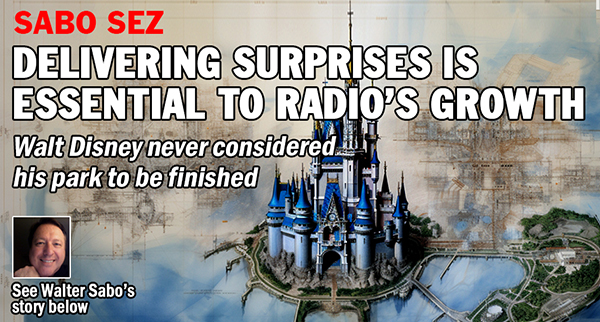
 In May 2007, I was enjoying the brand-new app called YouTube. Still independently owned, still relatively unknown. Some of the videos pulled millions of viewers, more viewers than enjoyed by ESPN or any cable network. More interesting, the videos with high counts were not made by NBC or ESPN or any traditional video source. High view count videos were being made by people with no experience in traditional media, they were experimenters producing in their basements and bedrooms.
In May 2007, I was enjoying the brand-new app called YouTube. Still independently owned, still relatively unknown. Some of the videos pulled millions of viewers, more viewers than enjoyed by ESPN or any cable network. More interesting, the videos with high counts were not made by NBC or ESPN or any traditional video source. High view count videos were being made by people with no experience in traditional media, they were experimenters producing in their basements and bedrooms. As your friends get fired and on-air hosts are replaced with WideOrbit and Profitable Software, the mournful refrain is to unfairly blame consolidation. Consolidation has, in fact, made the medium financially viable and brought hundreds of individual stations from a river of red ink to the glow of black ink. Prior to consolidation, over half the radio stations in the U.S. lost money – year after year. Not a secret stat, those numbers were revealed annually by the NAB.
As your friends get fired and on-air hosts are replaced with WideOrbit and Profitable Software, the mournful refrain is to unfairly blame consolidation. Consolidation has, in fact, made the medium financially viable and brought hundreds of individual stations from a river of red ink to the glow of black ink. Prior to consolidation, over half the radio stations in the U.S. lost money – year after year. Not a secret stat, those numbers were revealed annually by the NAB.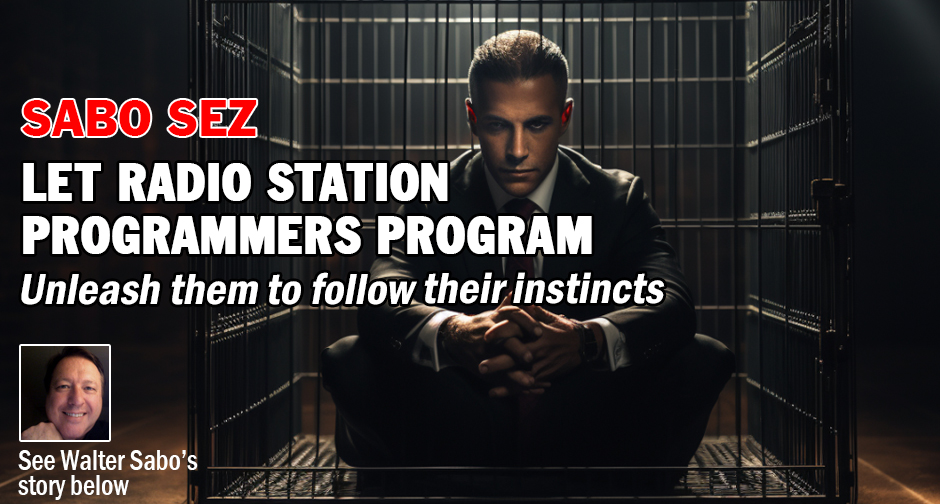
 HALF of all radio stations in the United States lose money – at least they did back in 1991. The NAB used to put out an annual report revealing how many radio stations were profitable. Usually half the stations in America lost money. Since consolidation, the NAB stopped putting out that report. It is reasonable to believe that far, far fewer stations lose money today. Shared costs, real estate, technical economies due to digital equipment versus analog all indicate that there must be fewer money-losing properties.
HALF of all radio stations in the United States lose money – at least they did back in 1991. The NAB used to put out an annual report revealing how many radio stations were profitable. Usually half the stations in America lost money. Since consolidation, the NAB stopped putting out that report. It is reasonable to believe that far, far fewer stations lose money today. Shared costs, real estate, technical economies due to digital equipment versus analog all indicate that there must be fewer money-losing properties. Amazing fact: In ancient times, from 1962-1972, the highest-paid on-air talent in New York City was “an overnight guy.” He was paid salary plus sales response. I’m talking about Long John Nebel on WOR, WNBC, then WMCA. Long John’s live reads moved product because his audience was captive. One-to-one his listeners were attached to their radios in the truck cab, night watchman’s building lobby, parents pacing with their babies, students cramming. His background was not in radio; he was a skilled auctioneer. Obviously, the same listeners exist today – and are anxious for someone to talk to them. Check out this old clip of Nebel in action:
Amazing fact: In ancient times, from 1962-1972, the highest-paid on-air talent in New York City was “an overnight guy.” He was paid salary plus sales response. I’m talking about Long John Nebel on WOR, WNBC, then WMCA. Long John’s live reads moved product because his audience was captive. One-to-one his listeners were attached to their radios in the truck cab, night watchman’s building lobby, parents pacing with their babies, students cramming. His background was not in radio; he was a skilled auctioneer. Obviously, the same listeners exist today – and are anxious for someone to talk to them. Check out this old clip of Nebel in action: 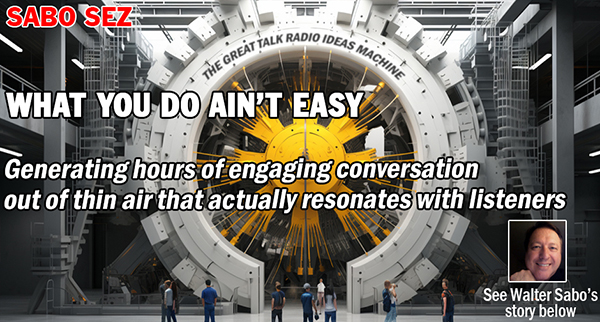

 In the early 1980s, talk radio made a $4 billion mistake. Prior to then, there were approximately 50 full-time talk stations in America. They were predominantly found in major markets and had been in the format since Marconi. The original talk stations had two key traits: They were dominant in ratings and much of their popularity was driven by women hosts.
In the early 1980s, talk radio made a $4 billion mistake. Prior to then, there were approximately 50 full-time talk stations in America. They were predominantly found in major markets and had been in the format since Marconi. The original talk stations had two key traits: They were dominant in ratings and much of their popularity was driven by women hosts.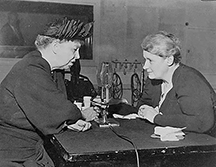 Then Mary Margaret read live copy. OR Mary Margaret had her guests read live copy. Sales for advertisers exploded. (Source: It’s One O’ Clock, Time for Mary Margaret McBride by Susan Ware
Then Mary Margaret read live copy. OR Mary Margaret had her guests read live copy. Sales for advertisers exploded. (Source: It’s One O’ Clock, Time for Mary Margaret McBride by Susan Ware  Last week I had the privilege of moderating a panel at the TALKERS conference. Confession: I listen to speech patterns and tones more than words.
Last week I had the privilege of moderating a panel at the TALKERS conference. Confession: I listen to speech patterns and tones more than words.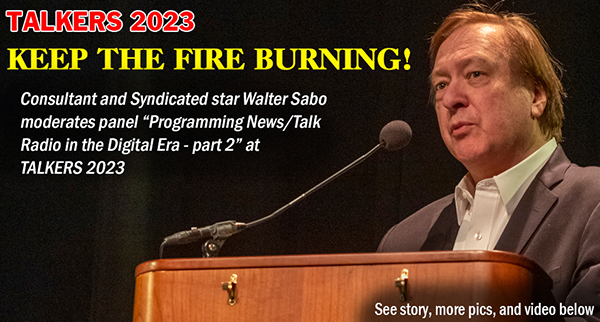
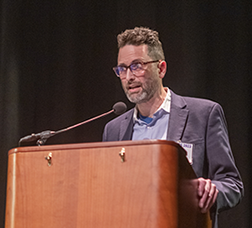 News/Talk Radio in the Digital Era – Part 2.” The session, sponsored by “Our American Stories,” is introduced by Alex Fife, VP operations, Southeast, iHeartMedia – Total Traffic & Weather Network (pictured at right) and moderated by Walter Sabo, CEO, Sabo Media and host (Walter Sterling) of Sterling on Sunday (pictured above). Panelists (pictured below from left to right) include Dan Mandis, program director and host, WTN-FM, Nashville; Ross Kaminsky, host KOA, Denver; Phil Boyce, SVP, spoken word format, Salem Media Group/ops VP, New York region/WMCA/AM 970; Josh Leng, CEO, Talk Media Network; and Matt Meany, program director, WABC, New York/Red Apple Media.
News/Talk Radio in the Digital Era – Part 2.” The session, sponsored by “Our American Stories,” is introduced by Alex Fife, VP operations, Southeast, iHeartMedia – Total Traffic & Weather Network (pictured at right) and moderated by Walter Sabo, CEO, Sabo Media and host (Walter Sterling) of Sterling on Sunday (pictured above). Panelists (pictured below from left to right) include Dan Mandis, program director and host, WTN-FM, Nashville; Ross Kaminsky, host KOA, Denver; Phil Boyce, SVP, spoken word format, Salem Media Group/ops VP, New York region/WMCA/AM 970; Josh Leng, CEO, Talk Media Network; and Matt Meany, program director, WABC, New York/Red Apple Media. 